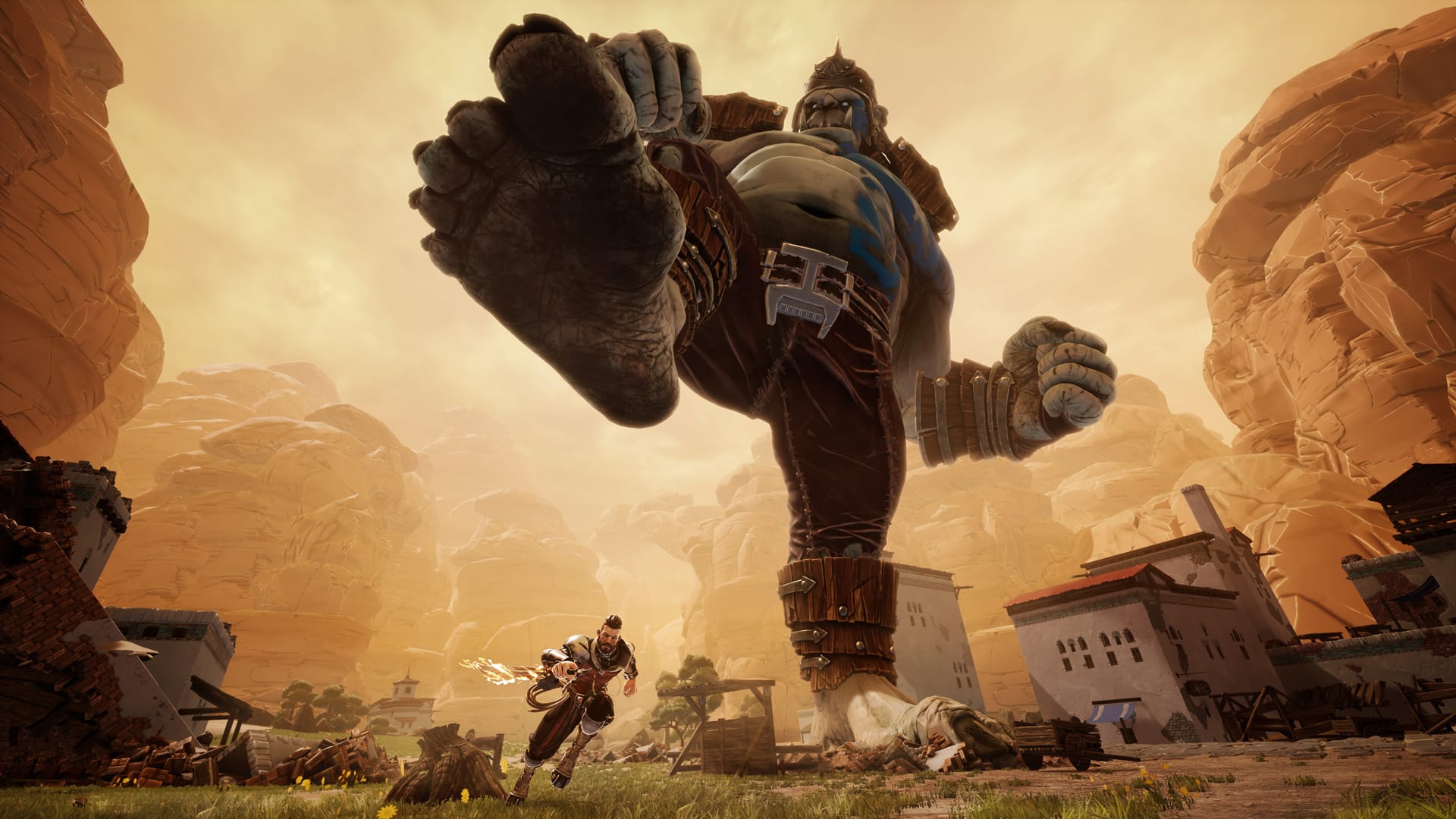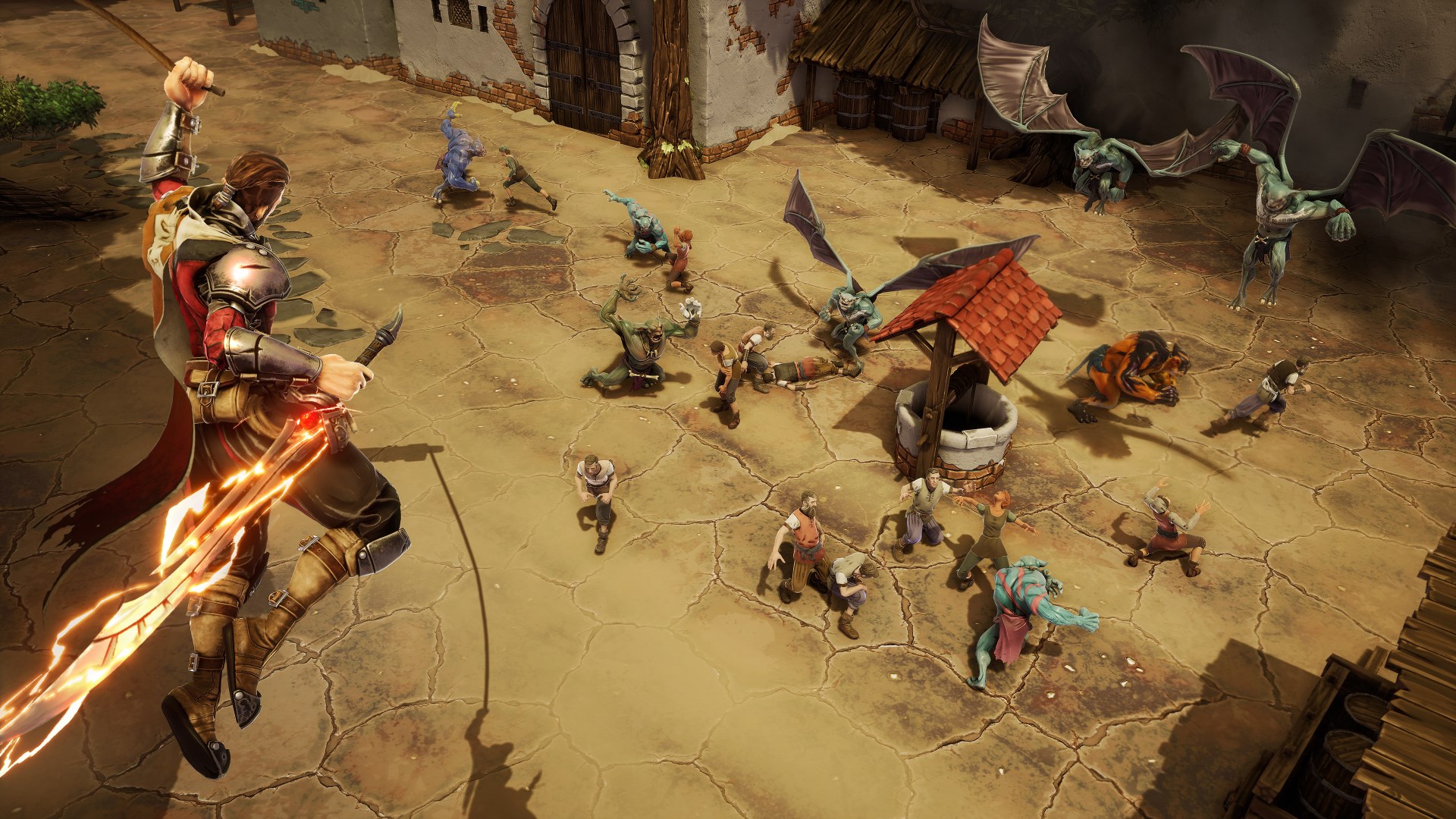Extinction aims to combine the scale of Shadow of the Colossus with the skill of a fighting game
It looks like Attack on Titan, but this isn't Attack on Titan.

On the surface, Extinction bears a striking resemblance to Attack on Titan. But as David Lang, founder of developer Iron Galaxy, and Maximum Games executive producer Derek Neal tell me this isn't just a rip-off of the insanely popular anime. Sure, you're slaying giant monsters who are trying to wipe out the last vestiges of humanity, but Extinction is leveraging Iron Galaxy's strong lineage in fighting games to make it feel like an entirely different beast.
"One of the things that I was always disappointed with in a lot of games where you fight giant monsters is that you don't really fight them—not in the same way as in a fighting game," says Neal. "Usually it's an abstraction, they have an health bar and you whack at their toe until they're dead or there's a quick-time event. We really wanted to make a game where you move and fight like a fighting game but against these enormous monsters."
That vision is immediately apparent the first time I saw Extinction at E3 this year, when the main character, Avil, chopped off a 150-foot-tall ogre's arm in my hands-off demo. This week I sat down with Lang and Neal to get a better idea of what they're aiming to accomplish. There's a captivating power fantasy at the heart of Extinction—that a lone warrior can effortlessly dismember a monster a hundred times his size. If you're OK with its arcade sensibilities, Extinction looks like a lot of fun.
I say "arcade" because Extinction almost feels like a game you'd want to play on a cabinet with a few friends peering over your shoulder, silently critiquing your performance. Unlike Attack on Titan or Shadow of the Colossus, killing is only half the battle. The other half is how cool you look while doing it.
Big unfriendly giant
For the most part, Extinction's missions revolve around a single concept: Massive ogres, called Ravenni, are marching towards a human settlement and Avil has to stop them. Each mission will have its own objectives to contend with, like defending four watchtowers or preserving a certain percentage of the city, but these seem like a simple way to give context to Extinction's real joy: slaughtering giant monsters.
Doing so, however, isn't as straightforward as in Attack on Titan. Avil can't simply catapult around the back of an ogre and decapitate it in one fell stroke but has to build up the power in his magical sword by completing secondary objectives and killing smaller monsters on the map. Only once his blade is charged can he disarm the Ravenni—literally. "Ogres protect themselves," Neal explains. "They'll try to swat you off their shoulders or they'll shake you off. If you go up and just try to decapitate one without taking off his arms, for example, he could swat you out of the sky and then you're dead."
This is where Extinction's parkour movement comes into play. As one ogre approaches the settlement, Avil quickly climbs up the side of a building, air-dashes over to another one, and runs along its wall before using a whip to swing toward the ogre's arm. Watching him move, I get the sense that Avil is like the bastard offspring of Spider-man and Ezio from Assassin's Creed.
The biggest gaming news, reviews and hardware deals
Keep up to date with the most important stories and the best deals, as picked by the PC Gamer team.
"We want to force action. We want to force important decisions on the player and all of that is something that is very core to the fighting game genre."
Dave Lang
Once you're high enough to reach an ogre's limbs, Avil can't simply chop one off. As dumb as these brutes might be, they at least have the good sense to strap on some armor. In order to expose a limb, Avil has to first break the bindings on the armor. Only then is he free to strike. But just because the ogre is missing an arm or a leg doesn't mean it's any less dangerous. During the demo, Avil takes a leg off one of the monsters and it falls on its ass. As Avil rushes around to try and get at the bindings on its gauntlet, it continually swipes and grabs at him.
Perhaps the biggest similarity that Extinction shares with Attack on Titan is that, after a time, ogres will regenerate their limbs—meaning you can't just chop off its arms and legs and leave it for dead. Once an ogre is sufficiently vulnerable that you feel safe going for the neck, Avil can use nearby buildings or climb up its back to get on its neck and deliver a charged 'runestrike' to sever the head.
Early on, Neal explains, ogres won't have much in the way of armor and what pieces they do have will be easily broken. As the campaign continues, however, they'll begin donning sturdier equipment with several bindings that need to be broken off before exposing the limb. An ogre that might take only seconds to behead early on could take precious minutes to kill later on—and you won't just be fighting one at a time.
As Lang explains, that's only one element at play during a mission. While the primary objective usually involves killing Ravenni, secondary objectives add a lot of wrinkles to consider. During one mission, Avil has the choice of rescuing groups of civilians by sending them through a portal, but doing so draws the ire of smaller monsters in the area. Successful players won't only need to master ogre-slaying but also think strategically about how to juggle the various objectives they're given.

Adding even more complexity is a destructible environment. Left unattended, ogres will begin smashing human settlements to pieces. Not only could this mean failing an objective, but it also severely limits Avil's movement options. "The execution in your combat matters and your choices matter," Lang says, drawing a comparison to the way fighting games are just as much about reflexes as they are critical decision-making. "We want to force action. We want to force important decisions on the player and all of that is something that is very core to the fighting game genre."
"The first time you play through Extinction can be really overwhelming, but you'll only need to focus on the one primary objective in order to complete the mission," Neal adds. "The more stuff you're trying to juggle, the more your skill and ability to make those meaningful decision that Dave is talking about matters."
Unsurprisingly, Extinction is meant to be played through multiple times. There is some built-in progression, like a skill tree that unlocks and enhances certain abilities. But I think the bigger sense of progression will, like in any fighting game, come from mastering Avil's moveset and learning how to juggle so many different objectives. In that sense, Extinction reminds me a little of Devil Daggers—a game that'll drive you to madness in pursuit of slightly better highscores.
Outside of the mission-based campaign, Extinction will also have leaderboards and a host of meta-competitive elements like daily challenges and a continuous wave-based mode to test just how competent you've become with Avil. Sadly, there's no direct multiplayer (which would be awesome).
Extinction will need to expand upon its giant ogre decapitation in new ways throughout the campaign to keep the combat feeling fresh.
Knowing Iron Galaxy's reputation in the fighting game genre, I'm excited to see how well their take on a big action game feels. The short demo I saw at E3 looked like a lot of fun, but also fairly narrow. Extinction will need to expand upon its giant ogre decapitation in new ways throughout the campaign to keep the combat feeling fresh. Adding more ogres to a fight is one way to do it, but I hope Extinction doesn't end up being a one-trick pony.
My only other concern is that Extinction will be shipping as a full-priced game and, based on what I've seen, that surprised me. Despite my excitement for what Iron Galaxy and Maximum Games are doing, what I've seen doesn't feel like it'd be packaged up with a $60 price tag. That said, the demo was pre-alpha and, aside from the basic premise, Lang and Neal aren't willing to talk concrete details about the campaign and its overall scope. They did say that story will be a central pillar to Extinction and Avil's quest to save humanity will introduce new characters through cutscenes in-between missions. I'm excited for Extinction and the ideas Iron Galaxy is bringing to the table. I just hope when it releases in early 2018, there's enough meat on its 150-foot-tall bones.
With over 7 years of experience with in-depth feature reporting, Steven's mission is to chronicle the fascinating ways that games intersect our lives. Whether it's colossal in-game wars in an MMO, or long-haul truckers who turn to games to protect them from the loneliness of the open road, Steven tries to unearth PC gaming's greatest untold stories. His love of PC gaming started extremely early. Without money to spend, he spent an entire day watching the progress bar on a 25mb download of the Heroes of Might and Magic 2 demo that he then played for at least a hundred hours. It was a good demo.


